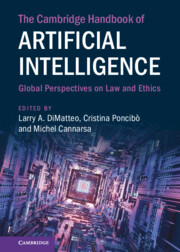Book contents
- The Cambridge Handbook of Artificial Intelligence
- The Cambridge Handbook of Artificial Intelligence
- Copyright page
- Contents
- Figures
- Contributors
- Foreword
- Preface
- Part I AI: Development and Trends
- Part II AI: Contracting and Corporate Law
- Part III AI and Liability
- Part IV AI and Physical Manifestations
- Part V AI and Intellectual Property Law
- Part VI Ethical Framework for AI
- 19 AI, Consumer Data Protection and Privacy
- 20 AI and Legal Personhood
- 21 AI, Ethics, and Law
- 22 Standardizing AI
- Part VII Future of AI
20 - AI and Legal Personhood
from Part VI - Ethical Framework for AI
Published online by Cambridge University Press: 28 July 2022
- The Cambridge Handbook of Artificial Intelligence
- The Cambridge Handbook of Artificial Intelligence
- Copyright page
- Contents
- Figures
- Contributors
- Foreword
- Preface
- Part I AI: Development and Trends
- Part II AI: Contracting and Corporate Law
- Part III AI and Liability
- Part IV AI and Physical Manifestations
- Part V AI and Intellectual Property Law
- Part VI Ethical Framework for AI
- 19 AI, Consumer Data Protection and Privacy
- 20 AI and Legal Personhood
- 21 AI, Ethics, and Law
- 22 Standardizing AI
- Part VII Future of AI
Summary
This chapter focuses on the question of whether, and under what circumstances, we might wish to attribute legal personality to AI-systems. It examines the issue of victims seeking compensation for physical harm or harm to property caused by AI-systems in a private law context, with a particular emphasis on recent developments and discussion at an EU level. The chapter proceeds from a distinction between a compensation model, where the AI is accorded independent legal personhood and victims are granted compensation directly from the AI itself, and a model where the AI is not accorded independent personhood and victims receive compensation from some other party held responsible for the harm caused by the AI. The rejection of personhood, which characterizes much of the current EU discussion, is often based on unconvincing arguments or, at least, an overly simplified account of the personhood model. There are therefore genuine difficulties with the various versions of the liability model and, given these difficulties, there may be some value in revisiting personhood, at least for harm caused by AI in certain situations.
Keywords
- Type
- Chapter
- Information
- The Cambridge Handbook of Artificial IntelligenceGlobal Perspectives on Law and Ethics, pp. 288 - 303Publisher: Cambridge University PressPrint publication year: 2022
- 3
- Cited by

